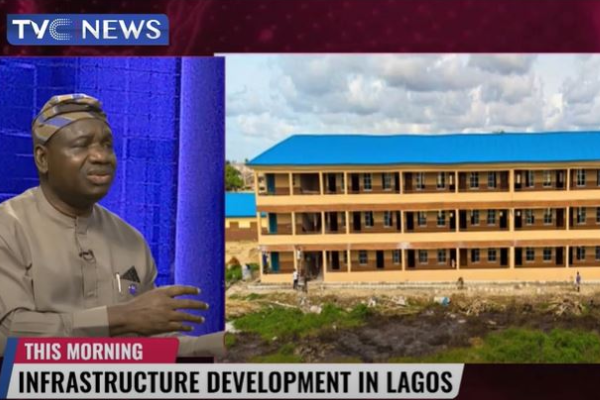The Chairman of the Economic and Financial Crimes Commission, EFCC, may not be spending time at the Custodial centre after being remanded by an FCT High Court judge for contempt.
This is because Abdulrasheed Bawa told journalists an appeal had been filed to set aside the order of the court, even though legal professionals have asked the EFCC Chairman to commit himself to the court order.
The anti corruption agency is however grappling with shock after an FCT High Court remanded its Chairman in Prison for Contempt.
The Judge, Chizoba Oji, convicted Mr Abdulrasheed Bawa and ordered the Inspector General of Police to put him in Kuje prison in Abuja for disobeying an earlier order of the court.
The EFCC and Mr Bawa’s offences border on failure to comply with a November the 21st, 2018 court order directing them to return a Range Rover and the sum of N40 million to the applicant in a suit.
In a statement, the EFCC Spokesman insisted that the Chairman had released the Range Rover in question to the Applicant on June the 27th, 2022 and had approved the process of releasing the remaining N40m.
Nonetheless, the order of the FCT High Court is yet to be obeyed, as the Anti Corruption agency has initiated a process to set aside the entire contempt proceedings and committal of its Chairman for contempt.
Contempt proceedings against heads of government agencies in the country are not new.
In December 2019, The Federal High Court sitting in Abuja ordered that the Director-General of the Bureau of Public Enterprises be remanded in a custodial facility for a minimum of 30 days.
Obeying such orders is usually the sticking point.
From the case of the former National Security Adviser, Sambo Dasuki to that involving Nnamdi Kanu, research has shown that the government and its agencies have violated several court orders.
On October the 20th, A Federal High Court in Abuja ordered the Governor of the Central Bank of Nigeria, Godwin Emefiele, to appear before it on January the 18th, 2023, to explain his refusal to obey valid order for payment of a $70m debt.
Disobedience to court orders have far-reaching consequences on the Rule of Law and experts are concerned.
In the extant case, what is yet to be seen is how the EFCC will succeed in setting aside the entire contempt proceedings and committal of its Chairman for contempt.
The Chairman of the Economic and Financial Crimes Commission, EFCC, may not be spending time at the Custodial centre after being remanded by an FCT High Court judge for contempt.
This is because Abdulrasheed Bawa told journalists an appeal had been filed to set aside the order of the court, even though legal professionals have asked the EFCC Chairman to commit himself to the court order.
The anti corruption agency is however grappling with shock after an FCT High Court remanded its Chairman in Prison for Contempt.
The Judge, Chizoba Oji, convicted Mr Abdulrasheed Bawa and ordered the Inspector General of Police to put him in Kuje prison in Abuja for disobeying an earlier order of the court.
The EFCC and Mr Bawa’s offences border on failure to comply with a November the 21st, 2018 court order directing them to return a Range Rover and the sum of N40 million to the applicant in a suit.
In a statement, the EFCC Spokesman insisted that the Chairman had released the Range Rover in question to the Applicant on June the 27th, 2022 and had approved the process of releasing the remaining N40m.
Nonetheless, the order of the FCT High Court is yet to be obeyed, as the Anti Corruption agency has initiated a process to set aside the entire contempt proceedings and committal of its Chairman for contempt.
Contempt proceedings against heads of government agencies in the country are not new.
In December 2019, The Federal High Court sitting in Abuja ordered that the Director-General of the Bureau of Public Enterprises be remanded in a custodial facility for a minimum of 30 days.
Obeying such orders is usually the sticking point.
From the case of the former National Security Adviser, Sambo Dasuki to that involving Nnamdi Kanu, research has shown that the government and its agencies have violated several court orders.
On October the 20th, A Federal High Court in Abuja ordered the Governor of the Central Bank of Nigeria, Godwin Emefiele, to appear before it on January the 18th, 2023, to explain his refusal to obey valid order for payment of a $70m debt.
Disobedience to court orders have far-reaching consequences on the Rule of Law and experts are concerned.
In the extant case, what is yet to be seen is how the EFCC will succeed in setting aside the entire contempt proceedings and committal of its Chairman for contempt.
The Chairman of the Economic and Financial Crimes Commission, EFCC, may not be spending time at the Custodial centre after being remanded by an FCT High Court judge for contempt.
This is because Abdulrasheed Bawa told journalists an appeal had been filed to set aside the order of the court, even though legal professionals have asked the EFCC Chairman to commit himself to the court order.
The anti corruption agency is however grappling with shock after an FCT High Court remanded its Chairman in Prison for Contempt.
The Judge, Chizoba Oji, convicted Mr Abdulrasheed Bawa and ordered the Inspector General of Police to put him in Kuje prison in Abuja for disobeying an earlier order of the court.
The EFCC and Mr Bawa’s offences border on failure to comply with a November the 21st, 2018 court order directing them to return a Range Rover and the sum of N40 million to the applicant in a suit.
In a statement, the EFCC Spokesman insisted that the Chairman had released the Range Rover in question to the Applicant on June the 27th, 2022 and had approved the process of releasing the remaining N40m.
Nonetheless, the order of the FCT High Court is yet to be obeyed, as the Anti Corruption agency has initiated a process to set aside the entire contempt proceedings and committal of its Chairman for contempt.
Contempt proceedings against heads of government agencies in the country are not new.
In December 2019, The Federal High Court sitting in Abuja ordered that the Director-General of the Bureau of Public Enterprises be remanded in a custodial facility for a minimum of 30 days.
Obeying such orders is usually the sticking point.
From the case of the former National Security Adviser, Sambo Dasuki to that involving Nnamdi Kanu, research has shown that the government and its agencies have violated several court orders.
On October the 20th, A Federal High Court in Abuja ordered the Governor of the Central Bank of Nigeria, Godwin Emefiele, to appear before it on January the 18th, 2023, to explain his refusal to obey valid order for payment of a $70m debt.
Disobedience to court orders have far-reaching consequences on the Rule of Law and experts are concerned.
In the extant case, what is yet to be seen is how the EFCC will succeed in setting aside the entire contempt proceedings and committal of its Chairman for contempt.
The Chairman of the Economic and Financial Crimes Commission, EFCC, may not be spending time at the Custodial centre after being remanded by an FCT High Court judge for contempt.
This is because Abdulrasheed Bawa told journalists an appeal had been filed to set aside the order of the court, even though legal professionals have asked the EFCC Chairman to commit himself to the court order.
The anti corruption agency is however grappling with shock after an FCT High Court remanded its Chairman in Prison for Contempt.
The Judge, Chizoba Oji, convicted Mr Abdulrasheed Bawa and ordered the Inspector General of Police to put him in Kuje prison in Abuja for disobeying an earlier order of the court.
The EFCC and Mr Bawa’s offences border on failure to comply with a November the 21st, 2018 court order directing them to return a Range Rover and the sum of N40 million to the applicant in a suit.
In a statement, the EFCC Spokesman insisted that the Chairman had released the Range Rover in question to the Applicant on June the 27th, 2022 and had approved the process of releasing the remaining N40m.
Nonetheless, the order of the FCT High Court is yet to be obeyed, as the Anti Corruption agency has initiated a process to set aside the entire contempt proceedings and committal of its Chairman for contempt.
Contempt proceedings against heads of government agencies in the country are not new.
In December 2019, The Federal High Court sitting in Abuja ordered that the Director-General of the Bureau of Public Enterprises be remanded in a custodial facility for a minimum of 30 days.
Obeying such orders is usually the sticking point.
From the case of the former National Security Adviser, Sambo Dasuki to that involving Nnamdi Kanu, research has shown that the government and its agencies have violated several court orders.
On October the 20th, A Federal High Court in Abuja ordered the Governor of the Central Bank of Nigeria, Godwin Emefiele, to appear before it on January the 18th, 2023, to explain his refusal to obey valid order for payment of a $70m debt.
Disobedience to court orders have far-reaching consequences on the Rule of Law and experts are concerned.
In the extant case, what is yet to be seen is how the EFCC will succeed in setting aside the entire contempt proceedings and committal of its Chairman for contempt.
The Chairman of the Economic and Financial Crimes Commission, EFCC, may not be spending time at the Custodial centre after being remanded by an FCT High Court judge for contempt.
This is because Abdulrasheed Bawa told journalists an appeal had been filed to set aside the order of the court, even though legal professionals have asked the EFCC Chairman to commit himself to the court order.
The anti corruption agency is however grappling with shock after an FCT High Court remanded its Chairman in Prison for Contempt.
The Judge, Chizoba Oji, convicted Mr Abdulrasheed Bawa and ordered the Inspector General of Police to put him in Kuje prison in Abuja for disobeying an earlier order of the court.
The EFCC and Mr Bawa’s offences border on failure to comply with a November the 21st, 2018 court order directing them to return a Range Rover and the sum of N40 million to the applicant in a suit.
In a statement, the EFCC Spokesman insisted that the Chairman had released the Range Rover in question to the Applicant on June the 27th, 2022 and had approved the process of releasing the remaining N40m.
Nonetheless, the order of the FCT High Court is yet to be obeyed, as the Anti Corruption agency has initiated a process to set aside the entire contempt proceedings and committal of its Chairman for contempt.
Contempt proceedings against heads of government agencies in the country are not new.
In December 2019, The Federal High Court sitting in Abuja ordered that the Director-General of the Bureau of Public Enterprises be remanded in a custodial facility for a minimum of 30 days.
Obeying such orders is usually the sticking point.
From the case of the former National Security Adviser, Sambo Dasuki to that involving Nnamdi Kanu, research has shown that the government and its agencies have violated several court orders.
On October the 20th, A Federal High Court in Abuja ordered the Governor of the Central Bank of Nigeria, Godwin Emefiele, to appear before it on January the 18th, 2023, to explain his refusal to obey valid order for payment of a $70m debt.
Disobedience to court orders have far-reaching consequences on the Rule of Law and experts are concerned.
In the extant case, what is yet to be seen is how the EFCC will succeed in setting aside the entire contempt proceedings and committal of its Chairman for contempt.
The Chairman of the Economic and Financial Crimes Commission, EFCC, may not be spending time at the Custodial centre after being remanded by an FCT High Court judge for contempt.
This is because Abdulrasheed Bawa told journalists an appeal had been filed to set aside the order of the court, even though legal professionals have asked the EFCC Chairman to commit himself to the court order.
The anti corruption agency is however grappling with shock after an FCT High Court remanded its Chairman in Prison for Contempt.
The Judge, Chizoba Oji, convicted Mr Abdulrasheed Bawa and ordered the Inspector General of Police to put him in Kuje prison in Abuja for disobeying an earlier order of the court.
The EFCC and Mr Bawa’s offences border on failure to comply with a November the 21st, 2018 court order directing them to return a Range Rover and the sum of N40 million to the applicant in a suit.
In a statement, the EFCC Spokesman insisted that the Chairman had released the Range Rover in question to the Applicant on June the 27th, 2022 and had approved the process of releasing the remaining N40m.
Nonetheless, the order of the FCT High Court is yet to be obeyed, as the Anti Corruption agency has initiated a process to set aside the entire contempt proceedings and committal of its Chairman for contempt.
Contempt proceedings against heads of government agencies in the country are not new.
In December 2019, The Federal High Court sitting in Abuja ordered that the Director-General of the Bureau of Public Enterprises be remanded in a custodial facility for a minimum of 30 days.
Obeying such orders is usually the sticking point.
From the case of the former National Security Adviser, Sambo Dasuki to that involving Nnamdi Kanu, research has shown that the government and its agencies have violated several court orders.
On October the 20th, A Federal High Court in Abuja ordered the Governor of the Central Bank of Nigeria, Godwin Emefiele, to appear before it on January the 18th, 2023, to explain his refusal to obey valid order for payment of a $70m debt.
Disobedience to court orders have far-reaching consequences on the Rule of Law and experts are concerned.
In the extant case, what is yet to be seen is how the EFCC will succeed in setting aside the entire contempt proceedings and committal of its Chairman for contempt.
The Chairman of the Economic and Financial Crimes Commission, EFCC, may not be spending time at the Custodial centre after being remanded by an FCT High Court judge for contempt.
This is because Abdulrasheed Bawa told journalists an appeal had been filed to set aside the order of the court, even though legal professionals have asked the EFCC Chairman to commit himself to the court order.
The anti corruption agency is however grappling with shock after an FCT High Court remanded its Chairman in Prison for Contempt.
The Judge, Chizoba Oji, convicted Mr Abdulrasheed Bawa and ordered the Inspector General of Police to put him in Kuje prison in Abuja for disobeying an earlier order of the court.
The EFCC and Mr Bawa’s offences border on failure to comply with a November the 21st, 2018 court order directing them to return a Range Rover and the sum of N40 million to the applicant in a suit.
In a statement, the EFCC Spokesman insisted that the Chairman had released the Range Rover in question to the Applicant on June the 27th, 2022 and had approved the process of releasing the remaining N40m.
Nonetheless, the order of the FCT High Court is yet to be obeyed, as the Anti Corruption agency has initiated a process to set aside the entire contempt proceedings and committal of its Chairman for contempt.
Contempt proceedings against heads of government agencies in the country are not new.
In December 2019, The Federal High Court sitting in Abuja ordered that the Director-General of the Bureau of Public Enterprises be remanded in a custodial facility for a minimum of 30 days.
Obeying such orders is usually the sticking point.
From the case of the former National Security Adviser, Sambo Dasuki to that involving Nnamdi Kanu, research has shown that the government and its agencies have violated several court orders.
On October the 20th, A Federal High Court in Abuja ordered the Governor of the Central Bank of Nigeria, Godwin Emefiele, to appear before it on January the 18th, 2023, to explain his refusal to obey valid order for payment of a $70m debt.
Disobedience to court orders have far-reaching consequences on the Rule of Law and experts are concerned.
In the extant case, what is yet to be seen is how the EFCC will succeed in setting aside the entire contempt proceedings and committal of its Chairman for contempt.
The Chairman of the Economic and Financial Crimes Commission, EFCC, may not be spending time at the Custodial centre after being remanded by an FCT High Court judge for contempt.
This is because Abdulrasheed Bawa told journalists an appeal had been filed to set aside the order of the court, even though legal professionals have asked the EFCC Chairman to commit himself to the court order.
The anti corruption agency is however grappling with shock after an FCT High Court remanded its Chairman in Prison for Contempt.
The Judge, Chizoba Oji, convicted Mr Abdulrasheed Bawa and ordered the Inspector General of Police to put him in Kuje prison in Abuja for disobeying an earlier order of the court.
The EFCC and Mr Bawa’s offences border on failure to comply with a November the 21st, 2018 court order directing them to return a Range Rover and the sum of N40 million to the applicant in a suit.
In a statement, the EFCC Spokesman insisted that the Chairman had released the Range Rover in question to the Applicant on June the 27th, 2022 and had approved the process of releasing the remaining N40m.
Nonetheless, the order of the FCT High Court is yet to be obeyed, as the Anti Corruption agency has initiated a process to set aside the entire contempt proceedings and committal of its Chairman for contempt.
Contempt proceedings against heads of government agencies in the country are not new.
In December 2019, The Federal High Court sitting in Abuja ordered that the Director-General of the Bureau of Public Enterprises be remanded in a custodial facility for a minimum of 30 days.
Obeying such orders is usually the sticking point.
From the case of the former National Security Adviser, Sambo Dasuki to that involving Nnamdi Kanu, research has shown that the government and its agencies have violated several court orders.
On October the 20th, A Federal High Court in Abuja ordered the Governor of the Central Bank of Nigeria, Godwin Emefiele, to appear before it on January the 18th, 2023, to explain his refusal to obey valid order for payment of a $70m debt.
Disobedience to court orders have far-reaching consequences on the Rule of Law and experts are concerned.
In the extant case, what is yet to be seen is how the EFCC will succeed in setting aside the entire contempt proceedings and committal of its Chairman for contempt.














